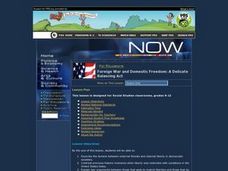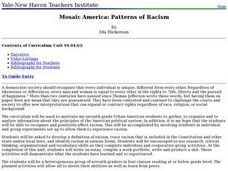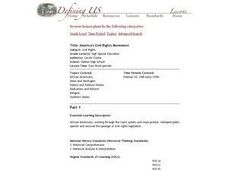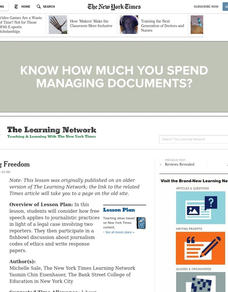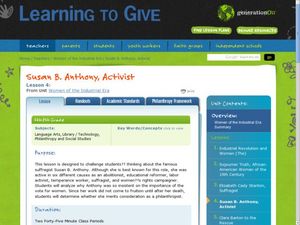Tennessee State Museum
Deciphering the Document: Unlocking the Meaning of the Emancipation Proclamation
Help your learners truly understand the Emancipation Proclamation by asking them the put it into their own words. After reading the document out loud to the class, and briefly discussing the legal language, split your class into small...
Curated OER
Black Kentuckians and the Civil War
Students demonstrate how the American Civil War affected black Kentuckians socially and politically. They identify and discuss the 13th Amendment to the U.S. Constitution, which forced the end of slavery in Kentucky months after the...
Curated OER
The Election
Students participate in an election. They are asked to vote for one of four candidates without knowing who they are or what they stand for. Students gain an important lesson when voting to make sure that security of freedom and...
Curated OER
"History of My Family"
High schoolers explore world geography by participating in a family history project. In this U.S.S.R. lesson plan, students read assigned text regarding the Stalinist era of Russia and the intolerance that thrived there. High schoolers...
Curated OER
In His Own Words: James Madison On the Problem of Faction
Students are introduced to the writings of James Madison and explain why he is often called "The Father of the Constitution". Using primary source documents, they examine his view of the Bill of Rights and what he meant by faction. In...
Curated OER
The Crash, the Dust, and the New Deal
Students explore the Great Depression. In this American history lesson, students examine primary sources in order to research the Stock Market Crash of 1929, the Dust Bowl, and the Neal Deal. Students study the impact on these events on...
Curated OER
American Justice on Trial
Students role play a trial in which they consider if the United States government violated the rights of Japanese Americans after Pearl Harbor.
Curated OER
Every Day Is Presidents' Day at the White House
Students explore the history of the White House and the role of the president. They explore the White House Historical Association website, answer questions, create a drawing of the Oval Office, and take an online quiz.
Curated OER
National Service: Lesson Plan
Students explore and take postions on the concept of mandatory community service. They then debate the issue in class as a learning model.
Curated OER
Overcoming Censorship Through Art
Learners examine and discuss government-imposed censorship of art and artists' methods for counteracting censorship. They view censored artwork, write a persuasive essay, and create an art piece.
Curated OER
Treaty Trail: Historical Perspectives Point of View
Students research the point of view of key figures present at the Walla Walla Treaty council. Students analyze primary and secondary sources to determine how various groups of people involved in the treaty council viewed the events as...
Curated OER
Foreign War and Domestic Freedom: A Delicate Balancing Act
Students investigate civil liberties in the U.S. They watch and discuss a PowerPoint presentation, conduct research on an event from a timeline, complete a worksheet, take an ideology quiz, and conduct a debate.
Curated OER
Mosaic America: Patterns of Racism
Seventh graders use print and electronic resources to gather and analyze information on the political system in the United States. Using the Constitution, they identify and discuss instances of racism included in amendments and laws. ...
Curated OER
America's Civil Rights Movement
Eleventh graders explore, analyze and study the background to America's Civil Rights Movement through the court system, mass protest, public opinion, political cartoons and legislation. They research Rosa Parks, Brown vs. Board of...
National Endowment for the Humanities
Magna Carta: Cornerstone of the U.S. Constitution
High schoolers use the Internet to read a brief description of Magna Carta (link provided). They "walk through" the document with the teacher, identifying four major themes. Students read and discuss "The Rhetoric of Rights: Americans...
Curated OER
Case Studies in Journalistic Ethics - Number 3
Students investigate ethical decision making when using photos in journalism. In this ethics in journalism lesson plan, students read about the ethical use of images in media, discuss recent controversial photos, and look at online case...
Curated OER
Paving the Road to the Constitution
Eighth graders argue for or against the ratification of the U.S. Constitution. For this U.S. government lesson, 8th graders complete four activities that encourage them to examine the strengths and weaknesses of the Articles of...
Curated OER
We Are The Freedom Riders
Students consider the role of the Freedom Riders. In this American Civil Rights lesson, students watch videos, listen to lectures, and conduct research regarding the participants in the Freedom Ride protest. Several weblinks, worksheets,...
Curated OER
Press-ing Freedom
Students consider how free speech applies to journalistic practices in light of a legal case involving two reporters. They participate in a fishbowl discussion about journalism codes of ethics and write response papers.
Curated OER
Peace and Aggression: A Challenge of Our Time
Students examine the arguments for and against the United States involvement in the Vietnam War. In groups, they must assign the Vietnam War a just or unjust war using the techniques used to fight and the reasons used by the government...
Curated OER
Why Do We Suffer From The Rights Of Others?
Students examine how diversity within populations has caused problems. In groups, they develop their own definitions of racism and discrimination. They participate in role-plays in which they gather the appropriate techniques to deal...
Curated OER
Beaver, or not?
Students study the role of the beaver in Illinois during the 1800's and how overtrapping cause the near extinction of the beaver colonies in Illinois by 1900. Students role play various people in 1945 who have an opinion about the...
Curated OER
Susan B. Anthony, Activist
Learners examine Susan B. Anthony's life and causes she worked for. In this Susan B. Anthony instructional activity, students work in groups to research the activist roles of Susan B. Anthony and decide if she was a philanthropist....
Curated OER
Historical Figure: A Monologue
Fourth graders develop their speaking skills. In this monologue lesson plan, 4th graders watch their instructors model a monologue regarding Abraham Lincoln. Students apply these skills as they research a historical figure from their...













